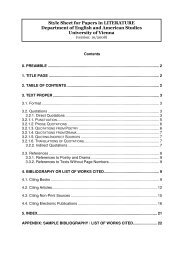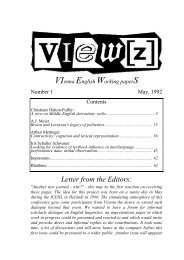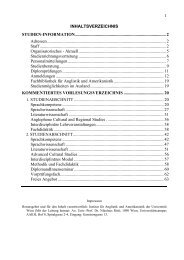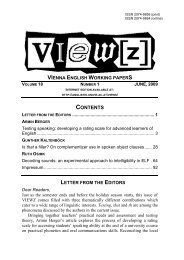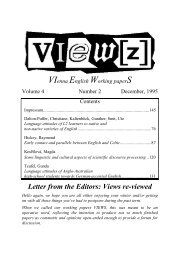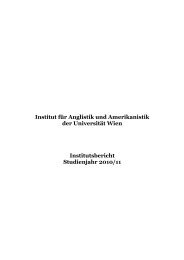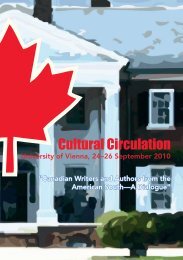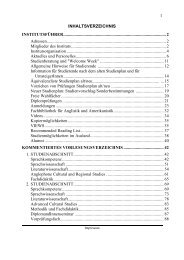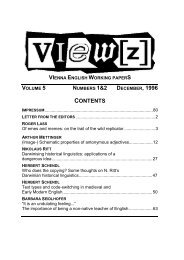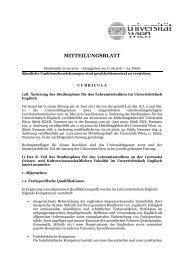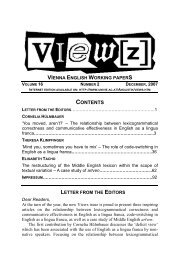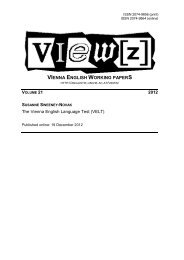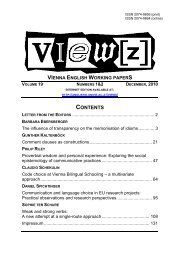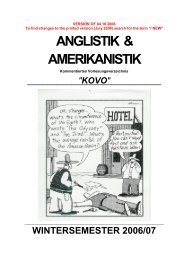1 INHALTSVERZEICHNIS STUDIEN-INFORMATION ...
1 INHALTSVERZEICHNIS STUDIEN-INFORMATION ...
1 INHALTSVERZEICHNIS STUDIEN-INFORMATION ...
You also want an ePaper? Increase the reach of your titles
YUMPU automatically turns print PDFs into web optimized ePapers that Google loves.
61<br />
Monika Seidl, Wed 10.30-12, Room 3 (ab 9.3.)<br />
Starting from the assumption that a picture may be worth a 1000 words, this class will examine<br />
the use of visual images in foreign language learning and will suggest practical applications for<br />
the classroom. We will cover a wide range of topics, such as visual strategies to support<br />
vocabulary acquisition, ways with classical art or film and language learning. You will have the<br />
opportunity to visit schools, observe lessons and gain some teaching practice.<br />
Requirements: regular attendance, participation in class discussions, teaching project.<br />
623: Methodology and ESP (English for Special Purposes)<br />
Barbara Mehlmauer-Larcher, Tue 11-13, Room 5 (ab 8.3.)<br />
This course is part of the ESP Module and its aim is to introduce participants to different ESP<br />
teaching contexts (e.g. HAK, HLA, HTL, adult education etc.) and to provide them with the<br />
necessary background knowledge for developing and implementing ESP teaching programs.<br />
Participants will have the opportunity to visit schools and educational institutions offering ESP<br />
classes for observations and some teaching practice.<br />
Assessment will be mainly based on participants' own projects.<br />
624: Words, words, words: Vocabulary in language teaching<br />
Angelika Rieder, Thu 13-15, Room 5 (ab 10.3.)<br />
This course aims at introducing participants to major issues in vocabulary teaching and learning<br />
that are specifically relevant in the language classroom. We will look at different aspects of<br />
vocabulary knowledge, discuss insights about vocabulary learning and the strategies involved,<br />
and draw conclusions about useful considerations for vocabulary teaching. Further topics will<br />
include testing vocabulary knowledge, designing and assessing vocabulary components of<br />
language courses, and computer-based vocabulary activities.<br />
The course will be carried out with e-learning support, including regular e-learning sessions and<br />
a slightly reduced number of face-to-face sessions. Visits to schools and teaching practice will be<br />
organised during the semester. Assessment will be mainly based on students’ own projects.<br />
Textbook: Thornbury, Scott. 2002. How to teach vocabulary. Harlow: Longman.<br />
NB: Participants need to have a Unet-account (i.e. a university email-address:<br />
aMatrikelnummer@unet.univie.ac.at) in order to be able to access the e-learning platform.<br />
(applications for Unet: http://www.univie.ac.at/ZID/unet, in case of questions please contact:<br />
angelika.rieder@univie.ac.at)



